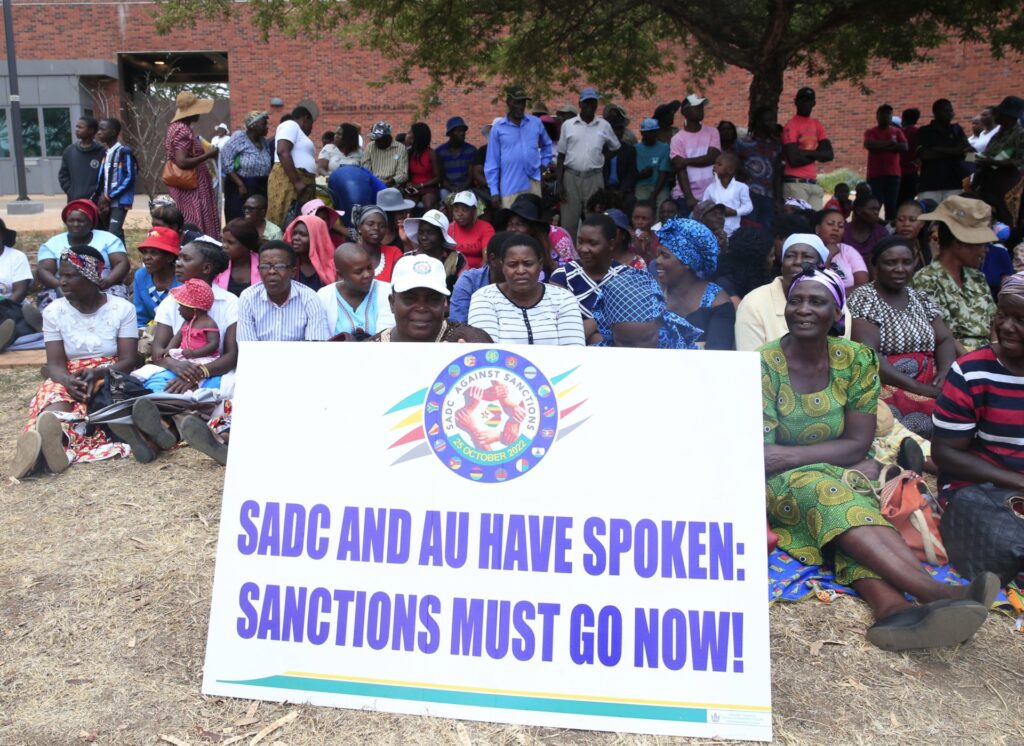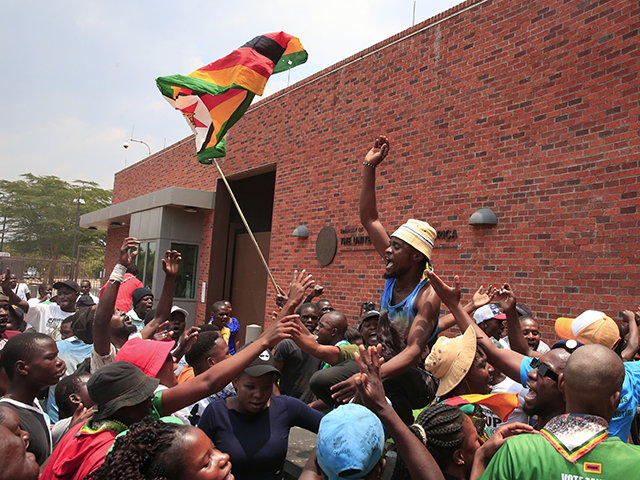The socialist authoritarian regime governing Zimbabwe celebrated “Anti-Sanctions Day” on Tuesday — a day to condemn America and other free states for imposing human rights sanctions on Zimbabwean officials — with mandatory participation in a host of bizarre rallies and parades.
The Southern African Development Community (SADC), a group of allied governments in the region, collectively marks October 25 as “Anti-Sanctions Day,” though Zimbabwe observes the event as a specifically anti-American endeavor. Zimbabwe has been under the brutal rule of the socialist Zanu-PF party since late dictator Robert Mugabe took over the country in 1980. Mugabe presided over a host of human rights atrocities in the nearly 40 years he controlled the formerly prosperous nation, most prominently the Gukurahundi genocide at the beginning of his rule.
Mugabe fell to a military coup led by his former intelligence chief, the current president of the country Emmerson Mnangagwa, in 2017. He was 93 when the coup occurred and 95 when he died. Mnangagwa was in his late 70s when he ousted Mugabe (and, notably, his wife and potential successor “Gucci” Grace Mugabe) and is currently 80.
Zimbabwean journalist Hopewell Chin’ono — who has been arrested, beaten, and tortured for his reporting on Zanu-PF repeatedly — published videos on social media on Tuesday of schoolchildren in the country participating in a marching band performance demanding an end to U.S. sanctions.
“Now this is why the world laughs at us,” he remarked.
Zimbabwean school kids being made to march against targeted sanctions imposed by America on ZANUPF elites for rigging elections, killing opponents & violating the constitution.
Now this is why the world laughs at us.
What effect will this march have on American legislators? pic.twitter.com/MNW1iBvPsF
— Hopewell Chin’ono (@daddyhope) October 25, 2022
The Zanu-PF state propaganda channels preferred to publish images online of rallies featuring adults chanting and holding up anti-American signs outside of the American embassy in the nation’s capital Harare.
Also outside Harare were reporters with China’s state-run Xinhua News Agency, which claimed that “thousands” of people surrounded the embassy to protest America. Xinhua recorded a group of mostly men dancing and chanting outside of the gates of the embassy.
“These sanctions, they pretend as if they are targeted sanctions, yet they are not targeted. Why? Because they are affecting everyone up to the grassroots,” one activist, identified as William Govha, told Xinhua. “The wealth of a country is determined by the freedom of that country to trade freely and to manage its own economics.”
Some reports indicated that individuals within the massive crowds outside the Harare embassy did not know until they arrived on the scene where they were going. Speaking to Zimbabwe’s NewsDay, a group of women said that government officials told them they were attending the funeral of Mnangagwa’s recently deceased grandson Yasha Mafidi and felt “duped” when they arrived at an anti-sanctions rally.
#AntiSanctionsDay 🔴‘We were duped; we thought we were going to President Mnangagwa's grandson funeral in #Masvingo, only to find ourselves in #Harare and being told to join a march against #sanctions’📹📸shephered Tozvireva
Posted by NewsDay-Zimbabwe on Tuesday, October 25, 2022
In areas outside of the capital, reports indicated that the government failed to generate much enthusiasm for Anti-Sanctions Day. The online newspaper New Zimbabwe described a “paltry crowd” and successful boycott of the event in the city of Bulawayo, the country’s second-largest.
“The few school children, who attended the commemorations, were ferried to and from by ZUPCO [the state-owned Zimbabwe United Passenger Company] and school buses,” the report noted.

People gather outside the United States Embassy compound on the Anti-Sanctions Day in Harare, Zimbabwe, on Oct. 25, 2022. (Shaun Jusa/Xinhua via Getty Images)
Contrary to Govha’s claims, American sanctions do not prevent other states from economically engaging with Zimbabwe, as ostentatiously demonstrated by Zimbabwe’s participation in China’s Belt and Road Initiative (BRI). The BRI is an international plan in which China offers predatory loans to poor countries intended for paying for infrastructure projects the countries could not otherwise afford.
BRI plans have resulted in significant riches for the wealthy – the Chinese government, for example, gifted lawmakers a new parliament building in Harare this June – but no benefits to the general population. In Zimbabwe, girls need to use dried-out cow dung in lieu of feminine sanitary pads and a reliable power grid is not a reality.
American sanctions have no significant impact on poverty in Zimbabwe, the Institute for Security Studies (ISS) in Pretoria, South Africa, observed on Tuesday, marking the anticipated “Anti-Sanctions Day” events.
“The targeted sanctions are more or less symbolic; a blunt instrument to enforce behaviour change,” the ISS explained. “For most individuals on the US sanctions list, the prospect of travelling to the US has always been remote, so banning them is of little import. However, sanctions can be a deterrent to some risk-averse investors.”
The organization called the government’s blame on sanctions for Zimbabwe’s dire economic situation “disingenuous and untrue,” adding, “the country’s inability to borrow money from international financial institutions has more to do with bad debt than sanctions.”
The sanctions serve to ban individuals in high-ranking positions within the government who engage in human rights abuses from dealing with American money. The list is updated regularly, most recently a month ago, to remove individuals if they cease their participation in the abuses or add individuals based on new reports.
Human rights abuses by Zanu-PF cronies are widespread and routine, the State Department detailed in its 2021 human rights report on the country. The specific abuses the report listed were:
Unlawful or arbitrary killings of civilians by security forces; torture and cases of cruel, inhuman, or degrading treatment or punishment; harsh and life-threatening prison conditions; arbitrary detention by security forces; political prisoners or detainees; arbitrary or unlawful interference with privacy; serious political interference that undermined judicial independence; serious government restrictions on free expression, press, civil society, and the internet, including violence, threats of violence, or unjustified arrests or prosecutions against journalists, censorship, and the existence of criminal libel laws; substantial interference with the rights of peaceful assembly and freedom of association; restrictions on freedom of movement; restrictions on political participation; widespread acts of corruption; lack of investigation of and accountability for gender-based violence, including crimes involving violence or threats of violence against women and girls; and laws criminalizing consensual same-sex sexual conduct between adults, although generally not enforced.
Rather than deny the human rights abuses on Anti-Sanctions Day, the Zimbabwean government largely ignores the accusations, instead vilifying sanctions as “neo-colonialism.”

COMMENTS
Please let us know if you're having issues with commenting.